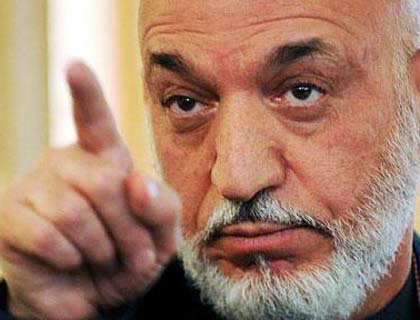In latest spat of war frustration, President Karzai accused the US of "double game" in Afghanistan, by ignoring, in his own words, "roots of terrorism", in Pakistan. To which Secretary Defense Leon Panetta rebuffed asking Karzai to "express gratitude" for the sacrifices of American forces.
Referring to Pakistan, Karzai said, "NATO and Afghanistan should fight this war where terrorism stems from. But the United States is not ready to go and fight the terrorists there. This shows a double game. They say one thing and do something else. If you are here to fight terrorism, then you should go to where their safe havens are and where terrorism is financed and manufactured".
These accusations are not new. But the way popular media reports, it does escalate tensions. In every meeting with US civilian and military leadership, Afghan leaders express gratitude for the American sacrifices in Afghanistan. It never gets a mention in the sensational mainstream media, but when there is a statement of criticism, it makes headlines.
Karzai is right when he says the US war on terror is not a war, but a counterinsurgency mission in Afghanistan. President Obama's AfPak policy has been a total failure. Efforts to reach to a political settlement with the Taliban have not only failed, but being a prime component of his withdrawal strategy, it has caused the frustration in Kabul and Washington, and uncertainty for Afghanistan beyond 2014.
Here are some fact reminders regarding Karzai's criticism of Obama's AfPak failure: Osama bin Ladin was killed in Pakistan. The remaining Al-Qaeda leadership cadre is probably hiding in Pakistani tribal areas. Haqqani Network based in North Waziristan launches major attacks on US troops in Afghanistan once in a while. Taliban Jihadi recruitment and logistic supply come from the safe havens in Pakistan.
The central leadership of all major insurgent factions is based in Pakistan, be it the Quetta Shura, the Haqqani Network in Waziristan, or the Hizb-e-Islami of Hekmatyar. Though Osama bin Ladin has been eliminated, but Al-Qaeda-allied groups like Tehreek-Taliban-Pakistan and Lashkar-e-Jhangvi foster anti-Americanism and Jihad in South Asia more than ever. Washington has failed to persuade the Pakistani military establishment to stop harboring Taliban and Haqqani Network and help bring them on negotiation table. Billions of dollar in military aid continue flowing to Rawalpindi.
President Obama has ignored roots of terrorism; with his troops' surge policy now in vain. Thus the doom predictions for Afghanistan after 2014 continue. The latest of which is an International Crisis Group report. It has the best analysis of our institutional crisis, lack of constitutional clarity and prospects of collapse of the current system due to political instability in Kabul after any mishandling of the political transition in 2014.
But the way popular media report, ignoring its policy recommendations, with headlines typically reading "Afghan Government/state to collapse after NATO withdrawal in 2014: ICG", it has huge psychological panic impact on the sense of uncertainty among ordinary Afghans about their future. Particularly our local press needs to adopt a careful and contextual tone while reporting such doom predictions.
The Way Forward
Calling it "rubbish" and "nonsense", President Karzai's spokesman has said the report is to pave grounds for 'foreign' meddling in elections. In a cabinet meeting, the council of ministers have also condemned and rejected the ICG report. It is unfortunate. The Karzai Administration should take the recommendations of the ICG report seriously. Though the ICG analysis has been widely discussed in Kabul TV talk shows and meetings of political groups before, it explains the challenges for political transition in 2014 with best analysis and policy recommendations. .
The doom predictions of Western think tanks and op-ed pages warn of crisis in Afghanistan after NATO withdrawal. Political transition is key to stability. Security challenges are secondary threats for collapse of the system and eventual chaos. The sophisticated Taliban insurgency will remain a challenge. But factors that can lead to fragmentation of ANSF after NATO withdrawal will not be primarily a deadlier insurgency. Unconstitutional attempts for power grab can cause our quick descent into chaos.
During the same press conference that President Karzai lashed out at President Obama's counterinsurgency policy, he expressed his intentions of smooth power transition in strongest words so far, but still there is lack of trust among political opposition in Kabul; and rightly so. Despite Karzai's pledges of legitimate political transition, he has not ensured a single practical step in this regard. The ICG report has excellent details on urgent needs of electoral reform and preparations for coming presidential polls.
If President Karzai is serious about his pledges of smooth political transition, the electoral reforms, legislation on issues pertaining to institutional crisis and preparations for presidential polls need to be accelerated now! Each day of delay increases the political uncertainty that can lead to crisis.
Afghanistan is not a top agenda in the US presidential debate. The Republican and Democrat candidates are ignoring America's longest war in history. Whoever makes the next US Administration in White House, it should get tough with Pakistan. As long as terrorists have safe havens there, the conflict in Afghanistan will continue, endangering the US and world security. The next US Administration should also ensure that a smooth and transparent transfer of power through a legitimate election with international support continue the current setup in Kabul.
Recently there have been rumors in Kabul about President Karzai's intentions to call a Loya Jirga and discuss Afghanistan's official acceptance of the Durand Line as legitimate border with Pakistan. It would be a courageous task, with risk of political unpopularity at home, but if President Karzai does that before his second and last term ends, he will leave behind a historical legacy and root out a major thorn in the AfPak conflict with real prospects of peace and security in the region.

